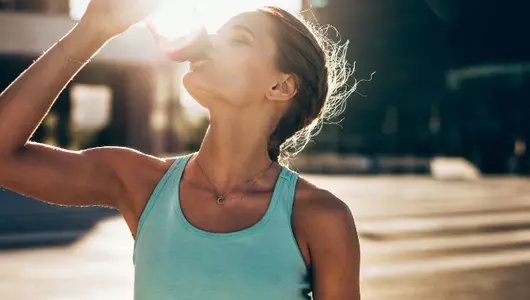
6 easy tips to avoid dehydration this summer
Summer is here!
As the weather heats up, it’s important to drink enough water and avoid dehydration—some signs of which include muscle cramps, dizziness or fatigue. A great starting goal is to consume 64 ounces per day. You may need more though depending on your size, activity level and how much you sweat. Here are some strategies to help you reach your water goals.
- Find a water bottle that works for you. It’s harder to drink water if it’s not readily available, so consider carrying a water bottle with you. Some bottles may have times marked on the side as a visual reminder of how much to drink by different points in your day. Others may have fun features like a built-in infuser or straw. Choose whatever type you enjoy!
- Add some flavor. If plain water doesn’t appeal to you, consider a low- or no-calorie addition. Some options include infusing the water with fresh fruits or herbs or using an electrolyte or beverage mix.
- Eat your water. Foods like fruits and vegetables are full of water! In addition to the different nutrients they provide, fresh produce can help you stay hydrated.
- Limit caffeine. Caffeine is a diuretic, meaning it will cause your body to let go of fluid. These beverages also tend to crowd out water in the diet, which creates the perfect storm for dehydration. Choose an herbal or decaf beverage instead.
- Hydrate before, during and after going outside. It’s easier to stay hydrated than to recover from dehydration. Drink plenty of water before heading out and make sure to keep drinking while you’re working or playing. Once you go back indoors, remember to rehydrate. If you’re feeling thirsty, you’re already mildly dehydrated.
- Check the color of your urine. If you’re well-hydrated, your urine should be clear or pale yellow. When your urine is darker, you’re most likely dehydrated.
Want more related content? We’ve got you covered. Explore these options:
Related articles

When to seek chiropractic care—5 symptoms you shouldn't ignore
Chiropractic care can provide relief for a variety of common ailments. Let’s walk through some of the most common symptoms that you shouldn’t ignore.

Pinched nerves, sciatica and carpal tunnel
Pinched nerves and related common conditions like sciatica and carpal tunnel syndrome can cause significant discomfort and interfere with your daily activities.

Essential tips for preventing sports injuries
Getting exercise is good for your body and soul, but being active comes with a level of injury risk. Our sports medicine experts offer up some useful tips to help.

Water or electrolyte drinks: What's better for athletes?
Staying hydrated is essential for all athletes and supporting their physical performance, but there's an ongoing debate: should they drink plain water or opt for electrolyte drinks instead?